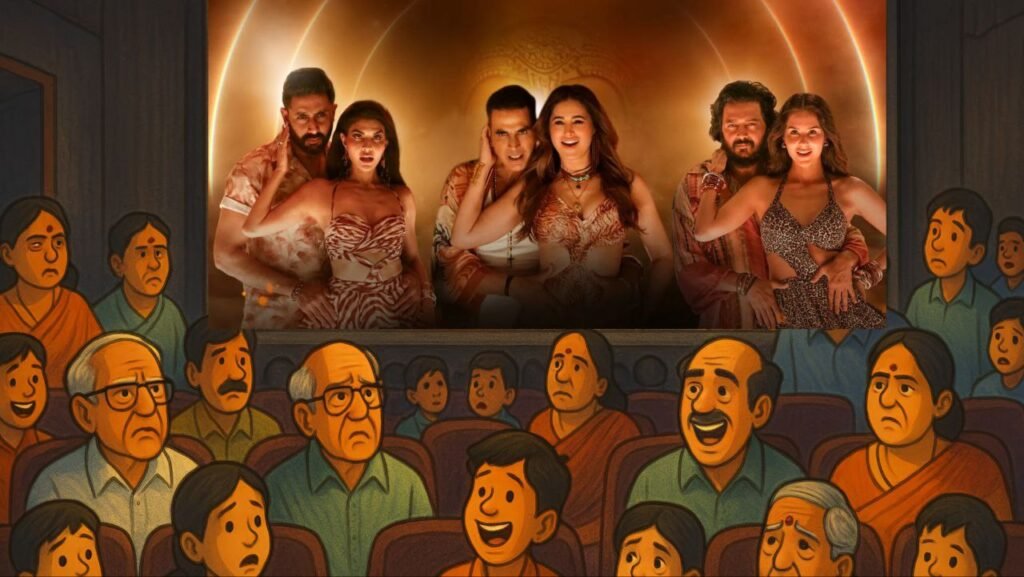The Problem with the Indian Censor Board

Cinema has a strong impact on people, especially on children and teenagers. It helps shape how we think, talk, and behave. In this situation, the double standards of the Indian censor board (CBFC) are not just confusing — they are dangerous.
Housefull 5 Gets a U/A Certificate Despite Vulgar Content
Let’s take Housefull 5 as an example. This film is part of a comedy series that has always used adult jokes, double meanings, and objectification of women. Still, the censor board gave it a U/A certificate, which means it is okay for children to watch with parental guidance.
In contrast, Oh My God 2 — a movie that tries to educate young people about sex education and health — was given an ‘A’ certificate, which makes it unavailable to teenagers, even though they are the ones who need it the most.
A Firsthand Experience at the Theatre
I personally experienced this contradiction while watching Housefull 5 at a multiplex. The theatre was full of families — parents, grandparents, and children, even toddlers. People were excited. The Mukesh tobacco ad played, the lights dimmed, and the film began.
But what followed was not family-friendly at all.
Crass Humour and Objectification of Women
The film starts with billionaire Ranjeet Dobriyal dying on his 100th birthday. Soon, several characters appear, including Shreyas Talpade, Dino Morea, Fardeen Khan, and others. Then, a female lawyer played by Soundarya Sharma enters, dressed provocatively, and becomes part of a vulgar joke. Shreyas Talpade’s character uses a rolled-up paper like binoculars to look at her as she crosses her legs. Also read: Housefull 5 Brings Nonstop Comedy Twists and Star Power Like Never Before.
Some people laughed, but many felt awkward.
In another scene, the camera focuses on her cleavage when she bends to pick up paper. Male characters stare at her openly. The joke may be outdated, but what really hit me was when a child — hardly 10 years old — laughed at the scene. What was he laughing at? What did he understand?
Inappropriate Jokes Passed Off as Comedy
The story becomes worse as Akshay Kumar, Abhishek Bachchan, and Riteish Deshmukh enter with their partners (Nargis Fakhri, Jacqueline Fernandez, and Sonam Bajwa). They try to prove they are related to the dead billionaire.
One clue is that the real heir has a foreign wife and a burn mark on his butt. What follows are jokes about skin exposure, sexual positions, and scenes where women are treated badly. In one part, Akshay Kumar tells Nargis to show her body to prove she is a foreigner. Jokes like “69” and scenes where women are touched inappropriately are shown as humour.
Children were watching all this. Their eyes were full of questions, but parents had no answers — because the censor board had told them it was “safe” content.
Oh My God 2: A Film That Tried to Educate
Now think about Oh My God 2. Released in 2023, the film talked about sex education, masturbation, and puberty in a sensitive and respectful way. Akshay Kumar played a divine guide who helped a teenager understand these important topics. The film was not vulgar, but instead tried to fill the gap left by schools and parents.
But what did the CBFC do? They delayed the film, asked for cuts, and gave it an A certificate. Even Akshay’s role had to be changed from Lord Shiva to “Shiv ka Das” to avoid hurting religious feelings.
Still, the same board saw no issue in giving Housefull 5 a U/A rating, even though it had sexual jokes and objectified women throughout. Also read: BBC Faces Backlash Over Sidhu Moose Wala Documentary.
Society’s Own Double Standards
The most painful truth is not just the censor board — it is us, the audience. Despite all the bad jokes and inappropriate content, Housefull 5 is doing very well at the box office. People are buying tickets, theatres are packed, and it is being called a “mass entertainer.”
We are the same people who laugh at sexist jokes in such movies, even when our children are watching. But we also complain loudly when a web series shows nudity or intimacy, even when it has a strong message.
The censor board is only reflecting what society believes — and that’s the real problem.
